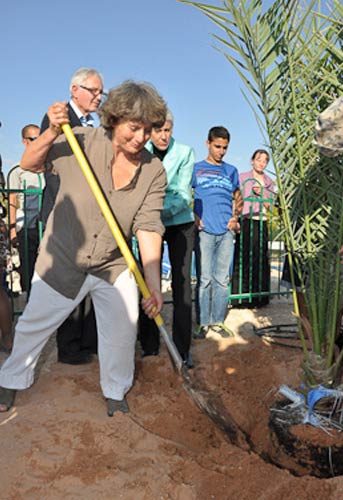By Rivka Borochov
The Natural Medicine Research Unit at Hadassah Organization in Jerusalem is Israel’s foremost center for the study of plant-based medicines from the Holy Land. Looking to ancient sources in texts, archeology, botany, folk medicine and biology, researchers there put together clues that could reveal breakaway medical cures of the future.
The center, founded and run by Sarah Sallon, led a project that germinated a 2,000-year-old Judean date palm seed, possibly the oldest seed in the world, with the expectation that one day its lost genome could give new treatments to mankind. The succulent date species, which no longer exists in the region, was rumored to cure tumors and work as an aphrodisiac.
While land-based flora are the specialty of the Natural Medicine Research Unit, which it researches under the Middle Eastern Medicinal Plants Project, the center has earmarked research time for exploratory research on seaweeds indigenous to the Mediterranean region.
Historical sources suggest, says Sallon, that local seaweed has important healing properties that could treat a range of ailments. “We built up a picture of interesting seaweeds that can be applied to peptic ulcers, as anti-infectious agents, anti-bacterials, anti-fungals and for healing,” she says. “We already know that it was used locally by putting it on an infected wound.”
A boost for conservation
The hundred or so plants she has surveyed from the region, including specimens found only in the sea, are yielding a treasure trove of baseline scientific research that awaits commercial partners.
Sallon’s team started working on seaweed back in the middle 1990s with Canadians from Memorial University in Newfoundland and the marine engineering firm Oceans Ltd. While the Canadians focused on the medicinal and commercial properties of Atlantic seaweed, Sallon tackled the unknown by looking at what’s found on Israel’s shores.
SEAMOP (Seaweed and Marine Organism Project) was seed-funded by the Canada-Israel Industrial Research Foundation, and it led to interesting findings that the Canadians have gone on to commercialize, says Sallon. Her Canadian partners progressed deeply into seaweed and its immune effects on cancer. They have also developed their own line of seaweeds for natural products.
New commercial partners will help Sallon allocate more research dollars to this still relatively unknown topic, she says. Also, inspiring more interest in Israel’s land- and sea-based plants could help aid in conserving these species for the future.

Sarah Sallon on the job
Sallon has worked with the Limnological Institute in Haifa to grow seaweed using new techniques in land-based aquaculture, and to isolate trace minerals and vitamins found in seaweed.
Seaweed, which is garnering international interest for its immense value as a nutraceutical and biofuel –– two areas in which Israeli companies excel –– is just one aspect of the Jerusalem center’s basic research.
“We’ve tested wild desert plants for a number of different effects, like on cancer, Alzheimer, Parkinson’s, anti-viral and anti-malarial, for tuberculosis. And we’d like to find natural pesticides,” says Sallon. Most of what’s been discovered stays under wraps to protect patents.
Plants for peace
While some plants from antiquity are mentioned in ancient sources time and time again, it’s tricky to figure out what they were used to treat. Coughing blood from tuberculosis is a straightforward symptom of the condition described in literature of the past, but the symptoms of Parkinson’s, which was definitely around in ancient times, don’t always fit the same patterns of description the medical community uses today, says Sallon, who works a bit like a detective.
A side benefit to scanning the Holy Land and the wider Middle East for healing secrets of its plants may be greater coexistence, because “plants know no borders,” she says.
Among her contacts over the years are Iranian botanists, who wish they could work directly with Israeli scientists, Sallon says.
Still, her work has her traversing the globe, giving talks and piecing together every new clue that could lead to the next new healing agent. Later this year she’ll be in Jordan talking at a medicinal plant conference.